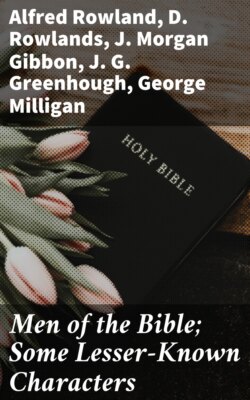Читать книгу Men of the Bible; Some Lesser-Known Characters - George Milligan - Страница 7
На сайте Литреса книга снята с продажи.
III.
ОглавлениеTable of Contents
"He was translated that he should not see death."
That was the crowning evidence and token of the Divine pleasure. Death is the wages of sin, the harbinger of retribution, the seal of man's humiliation and defeat. The fear of death is a bondage under which the race of man lies, save only where Christian faith and hope alleviate the terror and inspire a superhuman courage before which all fear is banished. The extraordinary nature of Enoch's piety could not be demonstrated by any fact so imperative as this, "He was translated."
There are three complete men in heaven. Man is threefold in his nature. He is body, soul, and spirit. He is not complete without his bodily organisation. The work of faith is not perfect, nor is the work of sin undone until at the Resurrection trump man shall stand complete in his threefold being. But of that completeness there are three specimens in heaven; Enoch from the patriarchal epoch; Elijah from the Jewish dispensation; and Christ from the Christian. The translation of Elijah was a marvellously dramatic episode. It was witnessed by Elisha and the sons of the prophets—and a heavenly equipage, lambent with supernal glow, carried him in triumph out of sight. But as to Enoch there was no such scenic display. "He was not found, for God took him." It was a quiet but beautifully fitting end. Moonlight rising into sunlight, the sweet calm light of a starlit sky becoming flushed with the auroral tints of a brilliant morning.
Translation means promotion, and also expansion.
It is promotion in honour, in office, in privilege. The bishop is translated from Rochester to Winchester and thence to Canterbury, because he has pleased his party and his sovereign. It is a sign that he has won promotion by devoted service. Christ says to his follower, "Occupy till I come"; and after a due period of labour well discharged, he says, "Come up higher." The rule of the Divine Kingdom is, "faithful in that which is least," then, "ruler over that which is much." Translation to Enoch meant the elevation to higher duties and enjoyments without the wearing agonies of disease, the sharpness of death, or the darkness of the grave.
It meant also expansion. In the passing from a lower to a higher condition, we cannot now realise the quick change which would pass over the material framework of the patriarch, but that it would be etherialised so as to be "a heavenly body" marvellously endowed with new powers of sense, of insight and locomotion, fit to be the instrument of a soul fully redeemed from the consequences of sin, we cannot doubt; and for thousands of generations has that soul sunned itself in the brightest fellowships and employments of the highest heaven.
